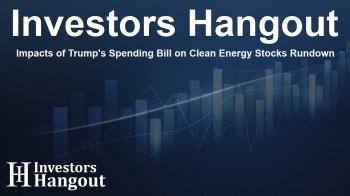Impacts of Trump's Spending Bill on Clean Energy Stocks Rundown

Impacts of Trump's Spending Bill on Clean Energy Stocks
Recent developments stemming from a new spending bill proposed by President Donald Trump have sent shockwaves through the clean energy sector. A significant measure in the bill introduces a tax on both wind and solar projects that rely on components manufactured in China. Moreover, the legislation pushes for a swifter discontinuation of tax credits compared to earlier drafts of the bill.
Key Observations from the Market
The response from the market has been telling, with shares of major energy corporations experiencing declines. NextEra Energy, recognized as the largest energy developer in the United States, suffered a setback of approximately 4%. Similarly, notable solar companies such as Array Technologies, Enphase Energy, and Nextracker witnessed stocks drop between 4% and 9%.
Rooftop Solar Companies Show Resilience
Interestingly, the bill's ramifications are not uniformly negative. Rooftop solar firms, in stark contrast, have reported gains. Notably, Sunrun, a frontrunner in the rooftop solar sector, saw its shares increase by more than 7%. SolarEdge Technologies also enjoyed an uptick of over 3%, showcasing the complex dynamics of the solar market.
Projected Legislative Changes
As the Senate gears up to vote on this pivotal bill, it is crucial to note that it seeks to abolish two of the primary tax incentives for solar and wind initiatives that are set to commence operations post-2027. This development poses challenges to the overall clean energy landscape.
Industry Leaders Voice Concerns
Elon Musk, CEO of Tesla, voiced strong criticism of the bill via social media, labeling it "utterly insane and destructive." He expressed concerns that it would jeopardize American jobs and undermine the country's strategic interests by prioritizing outdated industries over innovative sectors.
Details of the Tax Measures
The latest form of the bill presents a shift from prior versions, where projects starting before 2027 would qualify for tax credits. The new iteration imposes a tax on solar and wind projects that commence operations after 2027 if they incorporate Chinese-made parts, creating a further hurdle for clean energy initiatives.
Market Reactions and Stock Performance
On a temporary bright side, First Solar's stock witnessed an increase of more than 8%, likely due to the legislation preserving tax credits for manufacturers producing components and products. Conversely, analysts are dimming forecasts, particularly for companies dependent on these incentives.
Analysts Weigh In on Future Risks
GLJ Research's analysis indicates potential existential threats to solar companies like Sunrun as a direct consequence of the Senate's spending bill. Analysts caution that a loss of securitization capabilities may lead to crippling operational challenges for these firms.
Practical Implications for Investors
Investors are advised to pay close attention to how the Senate's decisions could reshape the financial landscape for clean energy stocks. Should changes come to fruition, firms may quickly find themselves incapable of servicing their systems, leading to potential investor exodus and a shaky market.
Conclusion: Navigating Uncertain Waters
As the clean energy sector braces for the implications of President Trump's spending bill, the dynamics within the industry remain complex. While some companies experience downturns, others, particularly in the rooftop solar space, seem to navigate these challenges more effectively. Market participants must remain vigilant as these events unfold and influence the future of renewable energy in America.
Frequently Asked Questions
What are the main implications of the new spending bill?
The spending bill introduces taxes on solar and wind projects utilizing Chinese components and accelerates the phase-out of tax credits, significantly impacting clean energy companies.
How have major clean energy stocks responded to the bill?
Major companies like NextEra Energy have seen stock declines, while rooftop solar firms like Sunrun experienced gains, highlighting differential impacts across the industry.
What are the concerns raised by industry leaders?
Elon Musk has criticized the bill, arguing it could harm American jobs and favor older industries over emerging clean energy sectors.
Why are rooftop solar companies performing better?
Rooftop solar firms may benefit from preserved tax credits for leased systems, contrasting with the broader market facing stricter regulations.
What should investors consider regarding these developments?
Investors should closely monitor legislative changes and their potential impacts on stock valuations and operational capabilities of clean energy companies.
About The Author
Contact Dylan Bailey privately here. Or send an email with ATTN: Dylan Bailey as the subject to contact@investorshangout.com.
About Investors Hangout
Investors Hangout is a leading online stock forum for financial discussion and learning, offering a wide range of free tools and resources. It draws in traders of all levels, who exchange market knowledge, investigate trading tactics, and keep an eye on industry developments in real time. Featuring financial articles, stock message boards, quotes, charts, company profiles, and live news updates. Through cooperative learning and a wealth of informational resources, it helps users from novices creating their first portfolios to experts honing their techniques. Join Investors Hangout today: https://investorshangout.com/
The content of this article is based on factual, publicly available information and does not represent legal, financial, or investment advice. Investors Hangout does not offer financial advice, and the author is not a licensed financial advisor. Consult a qualified advisor before making any financial or investment decisions based on this article. This article should not be considered advice to purchase, sell, or hold any securities or other investments. If any of the material provided here is inaccurate, please contact us for corrections.

